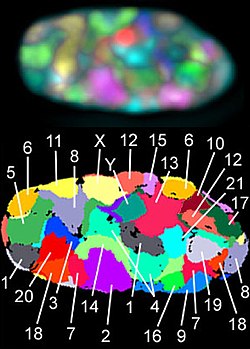Genetics/Course

The course objective is to provide students with a thorough knowledge of genetics. At the end of the course, a student should have a well-rounded, thorough knowledge and some exposure to heredity and epigenetics, each as they apply to humans.
The course is built upon the ongoing research performed by geneticists around the world and benefits from learning resources available here at Wikiversity.
In line with the Wikiversity ideal of learning by doing are some sixteen laboratory opportunities, an equal number of problem sets at several levels, and participatory lessons.
To present a wide variety of concepts within genetics, there are about forty-eight lectures which are also partly articles as references from the scholarly literature are included to challenge the student and open doors to further curiosity.
The course material is layered from a secondary to a university or tertiary level, topped off with an introduction to research, some of which is here at Wikiversity.
The general subject area is biochemistry. But, this includes knowledge from phosphate biochemistry, chemistry, biology, botany, zoology, and other subjects.
Prerequisites
[edit | edit source]Although a working knowledge of proteomics and genomics is beneficial, most of the concepts presented only require an introduction to genetics. Additional learning resources where the student may increase their background knowledge while progressing through the course are provided.
Completion levels
[edit | edit source]This course is dynamic. Each component resource has a level of completion icon following it based on ≥ 100 kb equals 100%:
- This resource is a stub, which means that pretty well nothing has been done yet. 0-5%.

- This resource is just getting off the ground. Please feel welcome to help! 6-15%.

- Been started, but most of the work is still to be done - 16-30%.

- About halfway there. You may help to clarify and expand it - 31-45%.

- Almost complete, but you can help make it more thorough - 46-60%.

- Ready for testing by learners and teachers. Please begin! 61-75%.

- This resource is considered to be ready for use - 76-90%.
 R
R - This resource has reached a high level of completion - 91-100%.
 C
C
Some of the lectures, especially from other departments or schools may not have a completion icon.
Other lectures may already be at 100 kbytes and will have no icon.
Lectures
[edit | edit source]Each set of three lectures are associated with the learning-by-doing laboratory experiences, quizzes for the student to test their learning progress with some additional information, 2-3 lengthier exams often referred to as 'hourlies' (may take an hour to work through at a timed pace), a mid-term exam which is all-encompassing for the first half, and a final exam over the entire course material. The examinations are designed to be taken iteratively as many times as the student desires to achieve a thorough working knowledge of the subject.
Here the lectures are listed alphabetically. A suggested sequence can be found in the course syllabus.
- Agriculture
- Anthropology
- Biochemistry
- Blood
- Bones
- Botany
- Cartilage
- Chromatins
- Chromosomes
- Collagen
- Cytoskeletons
- Ecology
- Exaptation
- Gene promoter
- Genotypes
- Human DNA
- Mediator complex
- Mutations
- Nucleotide synthesis
- Paleanthropology
- Phenotypes
- Phosphate budget
- Phospholipids
- Proteomics
- Ribosomes
- TATA box
- Theory of genetics
- Transcription factors
- Transcription of A1BG
- Zoology
Laboratories
[edit | edit source]For the course, any sixteen of the following labs should be completed.
- AGC box gene transcription laboratory
- ATA box gene transcription laboratory
- C and D box gene transcription laboratory
- CArG box gene transcription laboratory
- CGCG box gene transcription laboratory
- CRE box gene transcription laboratory
- E2 box gene transcription laboratory
- Enhancer box gene transcription laboratory
- Factor II B recognition element gene transcription laboratory
- GA responsive complex gene transcription laboratory
- GC box gene transcription laboratory
- H box gene transcription laboratory
- HNF6 gene transcription laboratory
- HY box gene transcription laboratory
- Initiator element gene transcription laboratory
- Metal responsive element gene transcription laboratory
- Phosphate budgets/Laboratory
- STAT5 gene transcription laboratory
- TATA box gene transcription laboratory
Lessons
[edit | edit source]Problem sets
[edit | edit source]Quizzes
[edit | edit source]- Agriculture/Quiz
- Anthropology/Quiz
- Biochemistry/Quiz
- Biology/Quiz
- Blood/Quiz
- Bones/Quiz
- Botany/Quiz
- Cartilage/Quiz
- Chromatins/Quiz
- Chromosomes/Quiz
- Collagen/Quiz
- Control groups/Quiz
- Cytoskeletons/Quiz
- Deoxyribonucleic acid/Quiz
- Ecology/Quiz
- Epigenetics/Quiz
- Epigenomes/Quiz
- Eukaryotes/Quiz
- Evolution/Quiz
- Exaptation/Quiz
- Gene promoter/Quiz
- Genes/Quiz
- Genetics/Quiz
- Gene transcriptions/Quiz
- Genomes/Quiz
- Genomics/Quiz
- Genotypes/Quiz
- Heredity/Quiz
- Human DNA/Quiz
- Human RNA/Quiz
- Human teeth/Quiz
- Lamarckism/Quiz
- Mediator complex/Quiz
- Melanocytes/Quiz
- Molecular genetics/Quiz
- Mutations/Quiz
- Nucleotide synthesis/Quiz
- Paleanthropology/Quiz
- Paleontology/Quiz
- Phenotypes/Quiz
- Phosphate biochemistry/Quiz
- Phosphate budget/Quiz
- Phosphate reactions/Quiz
- Phospholipids/Quiz
- Proteins/Quiz
- Proteomics/Quiz
- Radiation/Quiz
- Regions/Quiz
- Ribosomes/Quiz
- Spaceflights/Quiz
- TATA box/Quiz
- Teeth/Quiz
- Theory of genetics/Quiz
- Transcription factors/Quiz
- Transcription of A1BG/Quiz
- What is a human?/Quiz
- Zoology/Quiz
Hourlies
[edit | edit source]Midterm examination
[edit | edit source]Final examination
[edit | edit source]Alternate examinations that include the supplemental lectures are available.
Hypotheses
[edit | edit source]- Including alternate hypotheses in these resources can be developed into laboratories.
- Registered students can develop user subpages for labs, quizzes, and lessons.
See also
[edit | edit source]External links
[edit | edit source]- Craig Venter's work in creating synthetic life
- Genetic Discrimination Law
- GenomeNet KEGG database
- NCBI All Databases Search
- NPR Genetic Testing
- Home - Gene - NCBI
- Researchers see leap forward with frog genome advance
- Stem Cells Reverted to Germ Cells
- A talk about how genetics may change our world
- Interesting video on the possibilities of genetics
- WikiDoc The Living Textbook of Medicine
